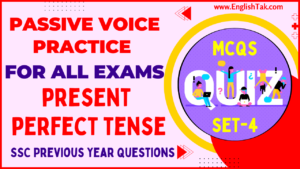![]()
Some Amazing rules of English Grammar
Table of Contents
Hello students, Today I am providing Some Amazing rules of English Grammar these rules put in a great thought. Even a great learner of English can stuck somewhere in these rules. I tried my level best to be as easy as I can be in writing these rules. I hope these rules can puzzle you while learning. These rules are very frequent in spoken as well as written English. These rules are taken from the basic to advanced level. If you are learning spoken English or English for competitive exams like ssc, ibps, banking, air-force, navy-force and other competitive exams.
Rule No. 1
There is no such word like ‘Amn’t’ exists in the English language. If you ever happen to write ‘Amn’t’ just write ‘Aren’t’.
Ex. I am a good teacher of English, amn’t I? (✗)
I am a good teacher of English, aren’t I? (✓)
Amn’t I coming to attend the party? (✗)
Aren’t I coming to attend the party? (✓)
Rule No. 2
There is no such word ‘Can not’ exists in the English language. We can either use ‘Cannot’ or ‘Can’t’. Always avoid using ‘Can not’.
Ex. I can not speak English fluent English. (✗)
I cannot speak English fluent English. (✓)
I can’t speak English fluent English. (✓)
Rule No. 3
When ‘S or Es’ is added to a verb it becomes singular. Remember when ‘S or Es’ is added to a noun it becomes plural. And a singular subject takes a verb having ‘S or Es’ in the present indefinite tense.
Ex. He speak fluent English. (✗)
He speaks fluent English. (✓)
She always come late. (✗)
She always comes late. (✓)
Note: एक बात का और ख्याल रखें कि Always होने के वाबजूद Verb के साथ Present Indefinite Tense में ‘S/Es’ का प्रयोग जरुर होगा क्योंकि Always एक Adverb है Verb नही
Rule No. 4
The word ‘Own’ can never be used alone if it does not function as a verb. It always comes with possessive adjective like ‘My, Our, Your, His, Her, Its, Their and Ram’s’. It is used after the possessive adjective. It emphasizes the possessive adjectives. If it is used as a verb it is normally used like other verbs.
Ex. She writes with own pen. (✗)
She writes with her own pen. (✓)
Do you drive own car? (✗)
Do you drive your own car? (✓)
She owns a big car. (Own – Verb) (✓)
Rule No. 5
There are two conditions where article ‘The’ is used before comparative degree the first is “if ‘Of the two or Of the two + plural noun’ is used after the comparative degree” and the second one is when parallel comparison is made between two things.
Sub + Verb + The + Comparative Degree + Of the two/Of the two + plural noun.
The + Comparative Degree + Sentence + The + Comparative Degree + Sentence.
Mind that:- We know that article ‘The’ is used before superlative degree.
Ex. She is more beautiful of the two students in our class. (✗)
She is the more beautiful of the two students in our class. (✓)
Radha is thinner of her two sisters. (✗)
Radha is the thinner of her two sisters. (✓)
More you read more you learn. (✗)
The more you read the more you learn. (✓)
Suggested For You |
| Grammar | EnglishTak YouTube Channel |
| Spoken English | Videos |
| Ranjan Sir Blog | Join Our WhatsApp Group |
Rule No. 6
There is no such word like ‘Fastly’ exists in the English language. ‘Fast’ is both an adjective and adverb. When it is used as an adjective it qualifies the noun but when it is used as an adverb it add something to the meaning of a verb.
Ex. This is a fastly train. (✗)
This is a fast train. (✓)
He runs fastly. (✗)
He runs fast. (✓)
Rule No. 7
The passive voice of ‘I know you’ is not ‘You are known by me.’ rather it is ‘You are known to me.’ Remember ‘Know’ does not take any preposition in the active voice but in the passive voice it takes ‘To’ instead of ‘By’.
Ex. She knows me.
I am known by her. (✗)
I am known to her. (✓)
We have known them.
They have been known by us. (✗)
They have been known to us. (✓)
Rule No. 8
‘To’ is not always followed by base form of verb (V1), It is sometimes followed by present participle form of verb (ing). Mind that it is followed by present participle form of verb only when it (To) is used as preposition. For convenient way I am providing a list of phrases after which present participle (ing) is after them.
Such phrases are as follow
Look forward to, Be addicted to, Be accustomed to, Be used to, Disposed to etc.
Ex. I am used to play cricket when I am free. (✗)
I am used to playing cricket when I am free. (✓)
She is addicted to gamble. (✗)
She is addicted to gambling. (✓)
Rule No. 9
Other words in a sentence does not mean anything. It always mean ‘MPT‘.
M → Adverb of manner
P → Adverb of Place
T → Adverb of Time
Note:- If they come in the same sentence they must be in the MPT order. If Time is emphasized it can be put at the beginning of the sentence but only in positive and negative sentences.
Ex. She comes daily here. (✗)
She comes here daily. (✓)
He danced yesterday at his school well. (✗)
He danced well at his school yesterday. (✓)
Rule No. 10
Blunder mistake is itself a blunder. Remember ‘Blunder’ means a big mistake or error and Mistake means minor mistake. So if you want to either use Blunder or Mistake, never use them together.
Ex. She made a blunder mistake yesterday. (✗)
She made a blunder yesterday. (✓)
She made a mistake yesterday. (✓)
Next part of
Some Amazing rules of English Grammar
is coming soon…





